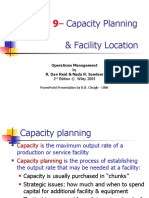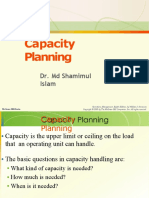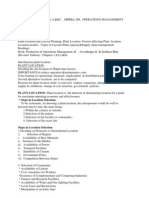Long Range Intermediate Range: Manufacturing
Uploaded by
Manal VermaLong Range Intermediate Range: Manufacturing
Uploaded by
Manal VermaMaster scheduling
Material requirements planning
Order scheduling
Weekly workforce and
customer scheduling
Daily workforce and customer scheduling
Process planning
Strategic capacity planning
Sales and operations (aggregate) planning
Long
range
Intermediate
range
Short
range
Manufacturing
Services
Exhibit 13.1
Sales plan Aggregate operations plan
Forecasting
& demand
management
Capacity Planning & Facility
Location
A. Measuring Capacity
B. Capacity Strategy
C. Capacity Planning & Evaluation Methods
D. Facility Location
E. Decision Stages & Factors Affecting Facility
Location
F. Scoring Rule For Location Decisions
G. Mathematical Models For Facility Location
H. Locating Facilities Globally
A. Measuring Capacity
Capacity - output rate of process
Design capacity - maximum output under ideal
conditions
Effective capacity - extended output rate under
normal conditions
Actual output < effective capacity
Capacity utilization = actual output/design capacity
Capacity efficiency = actual output/effective
capacity
Factors That Determine
Capacity
Process design
Product design
Product variety
Product quality
Production scheduling
Materials management
Maintenance
Job design & personnel management
Process Design & Capacity
Head Manuf.
400/day
Shaft Manuf.
360/day
Grip Manuf.
500/day
Assemble parts
Test align. & balance
210/day
Output
210 clubs/day
Head Manuf.
400/day
Shaft Manuf.
360/day
Grip Manuf.
500/day
Assemble
parts
400/day
Output
360 clubs/day
Test align.
& balance
420/day
B. Capacity Strategy
Match production capacity & customer
demand in most profitable way.
Consider facility, production & distribution
costs
Include lost sales costs & gains due to
quick response
Production Organization &
Facility Focus
Product-organized facilities
Process-organized facilities
Market-organized facilities
Focused Factories
Economies of scale vs. diseconomies of
scope
Focused facilities produce small set of
products
Plant-within-a-plant reduces problems of
focused facilities
Graphs Of Expansion Strategies
.
Capacity
Demand
C
a
p
/
D
e
m
Time
Capacity leading Capacity Lagging
Capacity Matching Steady expansion
Capacity
Demand
C
a
p
/
D
e
m
Capacity
Demand
C
a
p
/
D
e
m
C
a
p
/
D
e
m
Capacity
Demand
Capacity Expansion Strategies
Capacity leading (excess capacity)
+ can accommodate new/unexpected demand since there is a
capacity cushion
+ Always sufficient capacity to meet demand therefore revenue is
maximised and customer satisfied
+ Any critical startup problems with new plants are less likely to
affect supply to customers
+ can provide quick response
+ low overtime & subcontracting costs
high cost of unused capacity because of low utilization
Risk of even greater (or even permanent) over-capacity if
demand does not reach forecast levels
Capital spending on the plant early
Capacity lagging (maximum capacity utilization)
+ Always sufficient demand to keep the plants working at
full capacity, therefore unit costs are minimized
+ Over-capacity problems are minimized if forecast are
optimistic.
+ Capital spending on the plant is delayed
+ minimizes facility & equipment costs
Insufficient capacity to meet demand fully, therefore
reduced revenue and dissatisfied customers
No ability to exploit short-term increases in demand
cannot accommodate new or unexpected demand
Under supply position even worse if there are start-up
problems with the new plants
slow response at peak times
high overtime and/or subcontracting costs
often add capacity at peaks of business cycles
Demand matching strategy (using Inventory)
+ All demand is satisfied therefore customers are satisfied
and revenue is maximized.
+ Utilization of capacity is high and therefore costs are low
+ Very short term surges in demand can be met from
inventories
+ balances capacity & other costs
+ provides reliable service & responsiveness
must be able to predict demand well or have constant
demand
The cost of inventories in terms of working capital
requirements can be high. This is especially serious at a
time when the company requires funds for its capital
expansion
Risk of product deterioration and obsolescence
Steady expansion strategy
+ do not have to outguess competitors
excess capacity can result
Demand Strategies
Countercyclic products
Differential pricing & promotion
Capacity sharing
Fluctuating Demand & Unused
Capacity
.
Capacity
Demand
C
a
p
/
D
e
m
Time
Idle
Capacity
Countercyclic Products
.
Months
U
n
i
t
S
a
l
e
s
Jan Jun Dec Jun Dec
Mowers
Blowers
Total
C. Capacity Planning & Evaluation
Methods
Forecast capacity requirements
Make decisions
Break-even analysis
Decision analysis
consider probabilities of outcomes &
consequences
use decision trees to study problem
Experience effects increase capacity over
time
Welding Capacity Requirements
Product Weld time (sec) Demand
A 20 450,000
B 40 360,000
C 50 240,000
450,000 x 20 + 360,000 x 40 + 240,000 x 50
= 35,400,000 seconds = 590,000 minutes
Capacity = 220,000 minutes per line per year
Need 590,000 minutes/220,000 min/line = 3 lines
Break-even Analysis
Production cost = fixed cost + (variable cost x output
rate)
= FC + (VC x Q)
Revenue = revenue x units sold = p x Q
At break-even point Production cost = Revenue
Solve for break-even quantity, Q
Q = FC/ (p - VC)
Typical Production Cost
Function
.
Production
rate
C
o
s
t
Design
capacity
Fixed
cost
{
Piper Industries Example
Fixed cost of new plant = $2,500,000
VC = $12/pair of shoes
p = selling price = $27/pair of shoes
Cost = 2,500,000 + 12 Q
Revenue = 27 Q
Profit per pair = 27 - 12 = 15
Break-even quantity = 2,500,000/(27-12) = 166,667 pairs
Factors Affecting Facility Location
Nearness to raw material
Nearness to Markets
Availability of Labour
Availability of Fuel and Power
Availability of Water
Climatic Conditions
Government Policy
Land
Factors Affecting Facility Location
Community Attitude
Security
Transport Facilities
Momentum of an early start
Personal Factors
Communication Facilities
Other Considerations
D. Facility Location
Manufacturing
raw materials
labor
markets
Services
proximity to customers
Noxious facilities
remote locations
E. Decision Stages & Factors
Affecting Facility Location
Identify set of alternatives
Reduce set using evaluation procedures
Hierarchy of decisions
regional
local
site
Regional Decision
Market proximity
Proximity to raw materials
Availability of utilities
Labor supply & unionization
International locations also include
national taxes
legal restrictions
Local Decision
Taxes
Economic incentives
Attractiveness of community
Compatible industry
Transportation network
Government policy & attitude
Environmental regulations
Site Decision
Space for expansion
Proximity of other industry
Special Facilities
Public service facilities
proximity or access to users
also consider negative aspects (noise,
toxicity)
Retail/competitive service facilities
consider agglomeration effects
complementary businesses
access
exposure
Traffic Flow & Accessibility
Gas
Station
Gas
Station
Gas
Station
Gas
Station
N
F. Scoring Rule For Location Decisions
Linear scoring rule (LSR)
1. Identify important screening factors
2. Assign weights to factors
3. Rate each alternative on each factor
4. Overall rating = sum of factor weight x
rating
Example of LSR
Location Alternatives
Evaluation Factors Weights A B C
Space for expansion 0.2 10 8 5
Proximity to customers 0.3 5 7 10
Access to highways 0.1 4 6 10
Compatible industries 0.2 8 10 6
Local taxes 0.1 10 6 3
Local labor supply 0.1 6 9 10
Weighted total 7.0 7.8 7.5
G. Mathematical Models For
Facility Location
Useful when one criterion dominates
Transportation model of linear programming
0/1 integer programming
Terminal Industries
Trans Cost Fixed Unit
Ann.
Distributors Cost Prod.
Cap.
Plants Chi Den LA Dal Phil (000) Cost
(000)
Atlanta 8 12 18 10 7 500 20 150
Cleveland 4 11 20 12 6 600 22 180
Phoenix 15 7 8 9 20 750 18 170
Demand (000)120 80 150 100 130 Tot. capacity =
500
Total demand = 580
Choose from one of four alternatives to increase capacity
Decision Alternatives
New or Trans Cost Fixed Unit
Ann.
Expanded Distributors Cost Prod.
Cap.
Plants Chi Den LA Dal Phil (000) Cost
(000)
Expand Atl 8 12 18 10 7 800 19 250
Expand Pho 15 7 8 9 20 1,200 18 270
New Tucson 16 9 9 10 21 800 16 120
New Fresno 18 10 4 13 22 900 16 120
Transportation Problem
M factories, N customers
S
i
= production capacity of factory i
D
j
= product demand of customer j
c
ij
= cost to produce at factory i and ship to customer j
x
ij
= units made at factory i and sent to customer j
minimize z =
ij
c
ij
x
j=1
N
i=1
M
subject to
ij
x s
i
S
j=1
N
ij
x
i=1
M
=
j
D
Decision Method
Solve a separate transportation problem
for each of the 4 alternatives
Choose lowest cost alternative
Fixed Production +
Alternative Cost Trans. Cost Total
1. Exp. Atlanta 2,150,000 15,740,000 17,890,000
2. Exp. Tucson 2,300,000 15,650,000 17,950,000
3. New Tucson 2,650,000 15,250,000 17,900,000
4. New Fresno 2,750,000 14,650,000 17,400,000*
Optimal Solution
Produce at and Send to
150,000 Atlanta 40,000 Dallas
110,000 Philadelphia
140,000 Cleveland 120,000 Chicago
20,000 Philadelphia
170,000 Phoenix 80,000 Denver
30,000 Los Angeles
60,000 Dallas
120,000 Fresno 120,000 Los Angeles
Opening Multiple Facilities
Rama Manufacturing wants to open one or
more facilities to serve six markets
Five possible sites, Two plant sizes
Size Capacity Fixed cost Production cost
Small 150,000 1,500,000 20
Large 300,000 2,800,000 19
Ramas Decision
Determine:
1. Number of plants to open
2. Location of plants that are opened
3. Capacity of each plant that is opened
4. Number of units to ship from plants to
markets
Cost Data
Transportation Cost
Potential Markets
Sites Bos Chi Den LA Dal Phil
Atlanta 11 8 12 18 10 7
Cleveland 9 4 11 20 12 6
Hartford 3 12 19 27 16 5
Oakland 25 19 9 6 13 21
Phoenix 26 15 7 8 9 20
Exp. Dem
(000) 70 120 80 150 100 130
0/1 Integer Programming
Problem
y
1
= 1 if a 150,000 unit plant opened in Atlanta, 0 otherwise
y
2
= 1 if a 300,000 unit plant opened in Atlanta, 0 otherwise
y
3
= 1 if a 150,000 unit plant opened in Cleveland, 0
otherwise
x
ij
= number of units shipped from plant i to market j
i = 1, ..., 10 and j = 1, ..., 6 -- 60 variables
Formulation Of Fixed Charge
Problem
ij
x
i=1
10
=
j
D
ij
x
j=1
6
s
i
S
i
y
Min 1, 500, 000(
1
y +
3
y +... +
9
y ) + 2,800, 000(
2
y +
4
y +... +
10
y )
+
ij
c
j=1
6
ij
x
i=1
10
Demand constraints
Supply constraints
Optimal Solution
Produce at and Send to
150,000 Cleveland 120,000 Chicago
30,000 Dallas
300,000 Hartford 70,000 Boston
130,000 Philadelphia
300,000 Phoenix 80,000 Denver
150,000 Los Angeles
70,000 Dallas
Total cost = 23,690,000 (7,100,000 fixed + 16,590,000
variable)
Locating Public Services
Maximize customer service
Use p-center model
N distinct population centers
open up to p facilities (p based on budget)
M possible facility sites
d
ij
= distance (time or cost) for customers
at location j to be served at site i
minimize maximum distance
Decision Variables
y
i
= 1 if facility opened at site i, 0 otherwise
x
ij
= 1 if people at j assigned to facility i, 0 otherwise
w = maximum distance between any customer and the
serving (closest) facility
Formulation
minimize z = w
subject to
i
y
i=1
M
s p
ij
x =1 for every customer j = 1,...,N
i=1
M
ij
x
= N
i
y for every site i =1,..., M
j=1
N
ij
ij
d
x
s w for every customer j = 1,...,N
i=1
M
Complexity Of Problem
If M = 20 and N = 100
20 y
i
variables
20 x 100 = 2000 x
ij
variables
2020 0/1 variables
2
2020
possible solutions
Covering Problems
Locate facilities so everyone is within
specified distance of a facility
Emergency facilities - fire or ambulance
services
Build fewest facilities to cover everyone
Solved by solving a series of p-center
problems
Planar Location
Median (Steiner-Weber) problem
travel time proportional to distance
Center-of-gravity problem
travel time proportional to squared distance
Example
Locate facility to minimize distance to
regions in city
Customer Round Trips x y
Center i per Month Coord Coord
1 30 1 4
2 50 2 5
3 20 3 3
4 60 3 6
5 30 5 2
6 40 7 4
Customer Locations
0 1 2 3 5 6 7 4
x
y
Customer region center
Center of gravity point
o Euclidean median
1
2
3
5
6
7
4
1
2
3
5
6
4
o
Median Problem
Let d
i
(x,y) = distance from customer
location i to any location (x,y)
Let w
i
= number of trips from shop to
customer region i
Select x and y to minimize travel distance
Straight-line Distance Model
Minimize
i
w
i
d x, y ( )
i=1
6
Euclidean distance =
i
x x ( )
2
+
i
y y
( )
2
(
1 2
Minimize
i
w
i
x x ( )
2
+
i
y y
( )
2
i=1
6
Center Of Gravity Model
Median problem is hard to solve
Approximate using center of gravity model
Assumes travel cost proportional to square
of distance
Formulation & Solution
x=3.48
[30(1)+50(2)+20(3)+60(3)+30(5)+40(7)]/[30+50+20+60+30
+40]
y=4.00
[30(1)+50(5)+20(3)+60(6)+30(2)+40(4)]/[30+50+20+60+30
+40]
Optimal solution
x =
i
w
i
x | |
i
w | |, y =
i
w
i
y
| |
i
w | |
Minimize
i
w
i
x x ( )
2
+
i
y y
( )
2
(
i=1
6
H. Locating Facilities Globally
Cost advantages
Scale economies
Diversification & risk reduction
Government policies & foreign cultural
preferences
Information & technology exchange
Evaluating Foreign Sites
Foreign government policies
Foreign ownership allowed? Joint ownership
required?
Import/export restrictions?
Currency restrictions? Profit removal
restrictions?
Tariff regulations for export of product?
Is country part of special trading group?
Special product standards or govt approvals?
Regulations on labor unions?
Regulations on expatriate employees?
Foreign Customer Preferences
Do local customers have unique preferences?
Cultural preferences for domestically
produced goods?
Do names & slogans have intended meaning
in foreign language?
Are product changes needed to conform to
local custom & competing products?
Differences in skill & cultural aspects of
employees
Education & skills of local labor force?
Historical affection or animosity between parent and
local countries?
Standard work practices? Work day, week?
Vacations?
Religious traditions affecting work methods?
Need for multilingual workers?
Foreign resources
Do suppliers of material & services exist in foreign
country?
Special business conventions or distribution channels
required
You might also like
- Long Range Intermediate Range: ManufacturingNo ratings yetLong Range Intermediate Range: Manufacturing59 pages
- Strategic Capacity Planning For Products and Services100% (1)Strategic Capacity Planning For Products and Services33 pages
- Capacity Planning and Facility LocationNo ratings yetCapacity Planning and Facility Location33 pages
- Caterpillar's Supply Chain Strategy and Results: Ron Kruse0% (1)Caterpillar's Supply Chain Strategy and Results: Ron Kruse20 pages
- Chapter 9-: Capacity Planning & Facility LocationNo ratings yetChapter 9-: Capacity Planning & Facility Location33 pages
- Facility Location: Where Should A Plant or Service Facility Be Located?No ratings yetFacility Location: Where Should A Plant or Service Facility Be Located?33 pages
- Chapter 9-: Capacity Planning & Facility LocationNo ratings yetChapter 9-: Capacity Planning & Facility Location29 pages
- WINSEM2012-13 CP1147 02-Jan-2013 RM01 ORandInfoSysNo ratings yetWINSEM2012-13 CP1147 02-Jan-2013 RM01 ORandInfoSys30 pages
- Capacity Management in Industrial EngineeringNo ratings yetCapacity Management in Industrial Engineering30 pages
- Facility Location: Presented By:-Fedora - 76 Sharon-111 Manisha-114 Malcolm-89 Roshan-106No ratings yetFacility Location: Presented By:-Fedora - 76 Sharon-111 Manisha-114 Malcolm-89 Roshan-10644 pages
- Advanced Cons Methd Lecture Capacity and QualityNo ratings yetAdvanced Cons Methd Lecture Capacity and Quality46 pages
- Strategic Capacity Planning For Products and Services100% (1)Strategic Capacity Planning For Products and Services34 pages
- Capacity Planning For Products and Services: Mcgraw-Hill/IrwinNo ratings yetCapacity Planning For Products and Services: Mcgraw-Hill/Irwin38 pages
- Operations Management: Location StrategiesNo ratings yetOperations Management: Location Strategies58 pages
- Plant Location and Layout: Slide 1 of 75No ratings yetPlant Location and Layout: Slide 1 of 7537 pages
- Strategy Capacity Planning For Products and ServicesNo ratings yetStrategy Capacity Planning For Products and Services33 pages
- Manufacturing Wastes Stream: Toyota Production System Lean Principles and ValuesFrom EverandManufacturing Wastes Stream: Toyota Production System Lean Principles and Values4.5/5 (3)
- Click To Edit Master Subtitle Style: By:-Manal VermaNo ratings yetClick To Edit Master Subtitle Style: By:-Manal Verma24 pages
- Strategic Capacity Planning For Products and ServicesStrategic Capacity Planning For Products and Services
- Caterpillar's Supply Chain Strategy and Results: Ron KruseCaterpillar's Supply Chain Strategy and Results: Ron Kruse
- Facility Location: Where Should A Plant or Service Facility Be Located?Facility Location: Where Should A Plant or Service Facility Be Located?
- WINSEM2012-13 CP1147 02-Jan-2013 RM01 ORandInfoSysWINSEM2012-13 CP1147 02-Jan-2013 RM01 ORandInfoSys
- Facility Location: Presented By:-Fedora - 76 Sharon-111 Manisha-114 Malcolm-89 Roshan-106Facility Location: Presented By:-Fedora - 76 Sharon-111 Manisha-114 Malcolm-89 Roshan-106
- Strategic Capacity Planning For Products and ServicesStrategic Capacity Planning For Products and Services
- Capacity Planning For Products and Services: Mcgraw-Hill/IrwinCapacity Planning For Products and Services: Mcgraw-Hill/Irwin
- Strategy Capacity Planning For Products and ServicesStrategy Capacity Planning For Products and Services
- Operations Management: QuickStudy Laminated Reference GuideFrom EverandOperations Management: QuickStudy Laminated Reference Guide
- Manufacturing Wastes Stream: Toyota Production System Lean Principles and ValuesFrom EverandManufacturing Wastes Stream: Toyota Production System Lean Principles and Values
- Click To Edit Master Subtitle Style: By:-Manal VermaClick To Edit Master Subtitle Style: By:-Manal Verma


































































